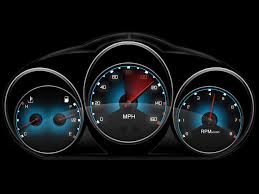Check the dashboard for warning lights
 When a warning light flashes on your car dashboard it’s a sign you need to pay attention to something. In the same way the dashboard of your car tells you important information at a glance, you can develop a few simple indicators that will tell you how your finances are going, and whether you need to take action to prevent damage.
When a warning light flashes on your car dashboard it’s a sign you need to pay attention to something. In the same way the dashboard of your car tells you important information at a glance, you can develop a few simple indicators that will tell you how your finances are going, and whether you need to take action to prevent damage.
Here are a few ways you can do this.
Oil Light. When the Oil light comes on in your car it’s because the oil pressure is at an unsafe level for your engine. Oil is there to keep your car engine healthy. In the same way, you should have an emergency fund to protect you from the grinding impact and crunching that could occur if you had an unforeseen financial downturn. An emergency fund should be tucked away and only used if necessary. Most financial advisers recommend an emergency fund be the saved total of three months net income. If your emergency fund gets below this level your oil light will come on.
Speed Warning. I used to own a car that had a speed-warning bell which sounded when my speed went over 110 kmh. Of course I hardly ever heard it go “ding”, but on the odd occasion that I did it warned me I was speeding. If you were to check the total of your monthly expenses would you find that you were speeding through your money? Most people don’t have a clue how much they spend each month, but you’re not one of those people, are you?! Check your total for the last few months, I’m sure the numbers will surprise you. And then compare the expense total to your total income for the month. If money going out is greater than money coming in then your speed-warning bell is going “ding”!
Rev Counter. When the engine works faster the rev counter increases to show this. Whilst high revs aren’t always a bad thing, they can be if your engine operates in this zone for an extended period of time. What ratio of your income is spent in paying for your debt? If you are spending 40-50% of your income paying for debt (including your mortgage) then you are working your financial engine too hard! When we accelerate in the car we often make the engine work in high revs to help us. Debt can do the same, when managed well. But you should be concerned if your revs remain high – I would recommend you slow your financial engine down by removing debt or increasing income.
We won’t talk about the air-bag light, that’s usually a sign you’ve hit something!
My goal here is to help you to see how helpful a dashboard could be to help you to manage your finances. The last thing you want is for a breakdown to be your first sign of trouble. Keeping an eye on some simple financial indicators will mean years of trouble-free motoring!
(This article was originally published in Phil’s regular column in the Waikato Times newspaper.)